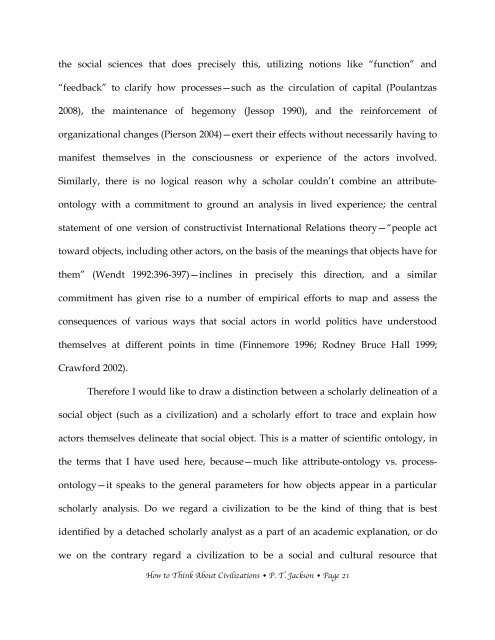How to Think About Civilizations - The Watson Institute for ...
How to Think About Civilizations - The Watson Institute for ...
How to Think About Civilizations - The Watson Institute for ...
Create successful ePaper yourself
Turn your PDF publications into a flip-book with our unique Google optimized e-Paper software.
the social sciences that does precisely this, utilizing notions like “function” and<br />
“feedback” <strong>to</strong> clarify how processes—such as the circulation of capital (Poulantzas<br />
2008), the maintenance of hegemony (Jessop 1990), and the rein<strong>for</strong>cement of<br />
organizational changes (Pierson 2004)—exert their effects without necessarily having <strong>to</strong><br />
manifest themselves in the consciousness or experience of the ac<strong>to</strong>rs involved.<br />
Similarly, there is no logical reason why a scholar couldn’t combine an attributeon<strong>to</strong>logy<br />
with a commitment <strong>to</strong> ground an analysis in lived experience; the central<br />
statement of one version of constructivist International Relations theory—“people act<br />
<strong>to</strong>ward objects, including other ac<strong>to</strong>rs, on the basis of the meanings that objects have <strong>for</strong><br />
them” (Wendt 1992:396-397)—inclines in precisely this direction, and a similar<br />
commitment has given rise <strong>to</strong> a number of empirical ef<strong>for</strong>ts <strong>to</strong> map and assess the<br />
consequences of various ways that social ac<strong>to</strong>rs in world politics have unders<strong>to</strong>od<br />
themselves at different points in time (Finnemore 1996; Rodney Bruce Hall 1999;<br />
Craw<strong>for</strong>d 2002).<br />
<strong>The</strong>re<strong>for</strong>e I would like <strong>to</strong> draw a distinction between a scholarly delineation of a<br />
social object (such as a civilization) and a scholarly ef<strong>for</strong>t <strong>to</strong> trace and explain how<br />
ac<strong>to</strong>rs themselves delineate that social object. This is a matter of scientific on<strong>to</strong>logy, in<br />
the terms that I have used here, because—much like attribute-on<strong>to</strong>logy vs. processon<strong>to</strong>logy—it<br />
speaks <strong>to</strong> the general parameters <strong>for</strong> how objects appear in a particular<br />
scholarly analysis. Do we regard a civilization <strong>to</strong> be the kind of thing that is best<br />
identified by a detached scholarly analyst as a part of an academic explanation, or do<br />
we on the contrary regard a civilization <strong>to</strong> be a social and cultural resource that<br />
<strong>How</strong> <strong>to</strong> <strong>Think</strong> <strong>About</strong> <strong>Civilizations</strong> • P. T. Jackson • Page 21
















